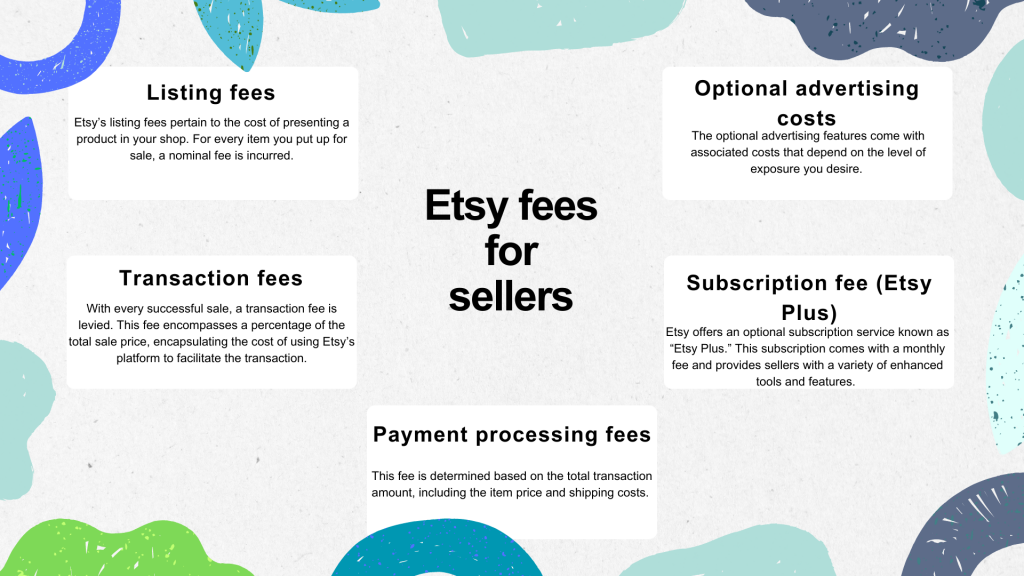In the bustling world of ecommerce, finding the perfect platform to showcase and sell your products is paramount. While Etsy stands tall as a popular ecommerce platform, it might not be the ideal fit for everyone. As businesses grow and evolve, the need for more diverse and customizable options becomes apparent.
In this guide, we’ll delve into the world of Etsy alternatives, exploring various platforms that offer unique advantages for ecommerce entrepreneurs.
A Word About Etsy
Founded in 2005, Etsy has emerged as a virtual marketplace where creative minds and artisans can share their handmade, vintage, and unique products with the world. With millions of sellers and buyers, Etsy has undoubtedly carved a niche for itself. The platform thrives on fostering a sense of community, allowing sellers to connect directly with their customers.
Etsy Seller Features
Etsy, as a versatile ecommerce platform, offers a rich tapestry of features that directly empower sellers to bring their products to the forefront of the digital marketplace. Beyond its vibrant community and extensive buyer base, Etsy boasts a toolkit of seller-centric functionalities that foster growth and brand establishment.
Ease of setting up an online shop
The journey from a product idea to a fully functional online store can be daunting, but Etsy simplifies this process remarkably. Aspiring entrepreneurs can swiftly navigate through the platform’s user-friendly interface to create their online haven of creativity. With step-by-step guidance and intuitive design tools, even those who are new to ecommerce can showcase their wares in a polished and professional manner.
Customization of listings
Etsy recognizes that every product is a unique work of art, deserving of an equally distinctive presentation. Sellers revel in the liberty to meticulously curate their listings, complete with high-quality images, compelling descriptions, and customizable attributes. This feature not only enables businesses to convey their brand story effectively but also helps potential buyers make informed purchasing decisions.
Seamless transaction process
Closing the deal is the ultimate aim, and Etsy streamlines this crucial aspect impeccably. The platform’s secure payment processing system ensures that both buyers and sellers can engage in transactions with confidence. A hassle-free checkout experience, integrated with popular payment gateways, eliminates friction points that could deter potential buyers from completing their purchases.
Integration of social media sharing
In the age of digital connectivity, social media has evolved into a powerful tool for amplifying brand presence. Etsy recognizes this trend and seamlessly integrates social media sharing options into its ecosystem. Sellers can effortlessly share their products across various platforms, enabling them to tap into their existing networks and reach broader audiences. This integrated approach not only bolsters brand exposure but also encourages engagement and word-of-mouth marketing.
Option for international shipping
The world is your market, and Etsy understands the importance of transcending geographical boundaries. With the option for international shipping, sellers can effortlessly cater to a global clientele. This expansive reach opens doors to customers from diverse cultures and regions, enhancing opportunities for growth and diversification.
As you can see, Etsy’s array of seller-focused features weaves a robust fabric that supports artisans and entrepreneurs alike.
Etsy fees
As with any platform, understanding the fees involved is crucial. Etsy’s fee structure includes listing fees, transaction fees, payment processing fees, and optional advertising costs. These fees play a pivotal role in determining the overall profitability of a business on the platform, as well as taxes for Etsy business.
Let’s break them down.

Listing fees
Etsy’s listing fees pertain to the cost of presenting a product in your shop. For every item you put up for sale, a nominal fee is incurred. This fee covers the creation of a listing, complete with images and descriptions. The ability to strategically manage your listings allows you to optimize your products’ visibility and appeal to potential buyers.
Transaction fees
With every successful sale, a transaction fee is levied. This fee encompasses a percentage of the total sale price, encapsulating the cost of using Etsy’s platform to facilitate the transaction. It’s essential to factor this fee into your pricing strategy to ensure that your profit margins remain robust.
Payment processing fees
Etsy’s payment processing system ensures a seamless monetary exchange between buyers and sellers. However, this convenience comes with a payment processing fee. This fee is determined based on the total transaction amount, including the item price and shipping costs. While it’s a necessary aspect of the selling process, understanding this fee can help you accurately estimate the true cost of each sale.
Optional advertising costs
Etsy’s ecosystem offers sellers the opportunity to boost their products’ visibility through advertising. These optional advertising features come with associated costs that depend on the level of exposure you desire. By strategically investing in advertising, you can increase your products’ prominence and potentially attract a larger audience.
Subscription fee (Etsy Plus)
In addition to the aforementioned transaction-based fees, Etsy offers an optional subscription service known as “Etsy Plus.” This subscription comes with a monthly fee and provides sellers with a variety of enhanced tools and features. These may include customizable shop themes, advanced shop customization options, and increased access to insights and analytics.
It’s worth noting that Etsy’s fee structure encompasses several components that collectively shape the economic landscape for sellers. These fees must be factored into your pricing strategy to ensure that your business remains not only sustainable but also profitable.
Why would you need an Etsy alternative?
While Etsy has its merits, it’s essential to recognize that it might not align with every business’s objectives. The platform comes with its own set of limitations and drawbacks, prompting some entrepreneurs to seek alternatives.
Etsy drawbacks and limitations
While Etsy offers an enticing array of benefits for sellers, it’s important to acknowledge that no platform is without its limitations. As you contemplate whether Etsy is the right fit for your ecommerce venture, it’s crucial to weigh these drawbacks against its advantages.
- Intense competition
Etsy’s popularity has led to a saturated marketplace, especially in certain niches. The influx of sellers competing for buyers’ attention can make it challenging for new or smaller businesses to stand out. Distinctive branding and unique product offerings are essential to carve a niche and differentiate yourself from the competition. - Limited customization
While Etsy allows some degree of shop customization, it’s constrained by the platform’s standardized templates and design options. This can restrict your ability to create a fully unique and immersive brand experience for your customers. As your business grows, you might find it necessary to express your brand identity more flexibly. - Dependency on Etsy’s policies
Etsy operates under a set of strict guidelines to ensure a consistent user experience. However, this can sometimes translate into stringent rules that might not align perfectly with your business model or creative vision. Adapting to these policies can feel limiting, especially if you’re looking for more autonomy in shaping your business practices. - Transaction fees Impact profitability
While transaction fees are common in ecommerce platforms, they can still affect your profit margins. The percentage-based transaction fee, in addition to other charges, can eat into your earnings. It’s essential to account for these fees when pricing your products to ensure you’re still generating a healthy profit. - Limited direct customer interaction
Etsy acts as an intermediary between you and your customers. This setup means that you have limited direct communication with buyers, and any customer service interactions go through the platform. While this can help maintain professionalism, it might also hinder your ability to establish a deeper rapport with your audience. - Branding challenges
Etsy places its branding prominently throughout the shopping process, which can detract from your efforts to build your own brand identity. For businesses aiming to foster a unique and cohesive brand image, this co-branding might not align with your vision.
In light of these drawbacks, it’s essential to consider your long-term goals and business strategy. While Etsy offers a valuable platform to kickstart your ecommerce journey, it might not provide the full range of flexibility and control that your growing business requires. Exploring alternatives can offer new avenues for growth and customization while addressing some of these limitations.
The move to multi-channel sales
As your ecommerce business gains momentum and begins to flourish, the prospect of expanding your reach beyond a single platform becomes an enticing proposition. This shift toward multi-channel sales marks a strategic evolution that can greatly impact your business’s growth trajectory.
- Expanding audience reach
While Etsy boasts a substantial user base, diversifying your sales channels allows you to tap into different demographics and markets. Each platform attracts its own unique audience, and by extending your presence to multiple channels, you broaden your customer base and increase your chances of connecting with new buyers. - Risk mitigation
Relying solely on a single platform exposes your business to inherent risks. Changes in algorithms, policies, or marketplace dynamics can dramatically impact your sales overnight. By distributing your sales across various channels, you mitigate the risk associated with relying solely on one platform and create a more stable revenue stream. - Customized branding
Expanding to alternative platforms gives you the freedom to tailor your brand’s presentation to each unique environment. You can create custom experiences and presentation templates that align more closely with your brand identity, ensuring consistent messaging and aesthetics across platforms. This level of customization fosters a stronger brand connection with your audience. - Leveraging specialized audiences
Different ecommerce platforms cater to different types of products and customer preferences. By diversifying your sales channels, you can align your products with the platforms that cater specifically to your target audience. This tailored approach increases the likelihood of resonating with buyers who are actively seeking your offerings. - Enhancing customer engagement
Each platform has its own set of features and engagement tools that you can leverage to interact with your audience. Whether it’s live streaming, community forums, or unique advertising options, multi-channel selling allows you to experiment with various strategies to engage and retain customers effectively. - Cross-promotion opportunities
Operating across multiple platforms opens up opportunities for cross-promotion. You can strategically drive traffic from one platform to another, creating a synergistic effect that boosts your overall online presence. For instance, you could promote your Etsy shop on your website or social media channels, and vice versa.
Etsy alternatives you might want to consider
In light of all the above, it’s only logical for a small business to search for the ways to overcome a platform’s limitations or expand their reach. So, sooner or later, you’ll come to the idea of looking for an Etsy alternative. The world of ecommerce is vast, with numerous platforms and marketplaces vying for attention. But here, we’ll speak of the most popular Etsy alternatives that businesses might consider.
Shopify
At the forefront of ecommerce platforms stands Shopify, renowned for its user-friendly interface and comprehensive toolkit. With a seamless backend navigation and intuitive design, Shopify caters to both seasoned entrepreneurs and newcomers to the ecommerce scene.
Central to Shopify’s appeal are its customizable templates, enabling businesses to craft online storefronts that mirror their brand identity. This design flexibility, coupled with a consistent user experience across devices, fosters trust and engagement among potential customers.
Shopify’s integrated payment gateways facilitate secure and hassle-free transactions. Meanwhile, its robust app store empowers businesses to enhance their store functionalities, tailoring their online presence to meet unique needs. With scalability catering to ventures of all sizes, Shopify is a catalyst for growth in the ever-evolving world of ecommerce.
WooCommerce
For those entrenched in the WordPress ecosystem, the natural progression to ecommerce excellence lies in embracing WooCommerce. This dynamic plugin seamlessly integrates into your existing WordPress website, offering an unparalleled pathway to venture into online selling. Its true strength lies in the fusion of the familiarity of WordPress with the robustness of a fully functional ecommerce platform.
One of WooCommerce’s standout features is its ability to provide extensive customization options, transforming your website into a tailored digital storefront. This aspect is particularly attractive for businesses keen on maintaining a unique brand identity and user experience. With the power to shape every facet of your online store’s appearance and functionality, WooCommerce grants you a level of control that resonates with businesses striving for distinctive online presences.
The allure of WooCommerce extends beyond its customization prowess. It grants you the autonomy to define the intricacies of your online store’s operations, from product listings to payment gateways. Whether you’re a small enterprise looking to dabble in online sales or a growing business aiming to leverage the power of WordPress, WooCommerce emerges as a robust choice that harmonizes seamlessly with your existing framework, propelling your ecommerce journey to new heights.
Sellfy
For creators immersed in the world of digital products, Sellfy emerges as a specialized haven designed to amplify their success. This platform is a streamlined avenue tailored to the needs of artists, authors, musicians, and content creators seeking to monetize their digital offerings. Sellfy’s singular focus on digital goods and its array of tailored features set it apart as a go-to choice in the realm of online sales.
The heart of Sellfy’s appeal lies in its seamless platform, engineered with simplicity in mind. Navigating through the process of listing, promoting, and selling digital products is intuitive and hassle-free. This user-friendly experience empowers creators to channel their energy into crafting compelling content, confident that the selling aspect is well-taken care of.
Central to Sellfy’s prowess is its digital delivery capabilities. Swift and secure delivery of digital goods to customers is a defining trait of this platform. Whether it’s ebooks, music tracks, videos, or other digital creations, Sellfy ensures that customers receive their purchases promptly and conveniently. This feature, combined with the platform’s emphasis on a user-friendly interface, positions Sellfy as an indispensable tool for digital creators looking to monetize their artistic endeavors.
eBay
As a ubiquitous presence in the world of online selling, eBay stands as a true powerhouse, recognized for its colossal user base and extensive array of product categories. With a legacy that spans decades, eBay has established itself as a versatile platform catering to a diverse range of buyers and sellers. Its multifaceted approach to online commerce, encompassing auction-style listings and “Buy It Now” options, makes it a perennially attractive destination for those seeking both unique finds and everyday essentials.
Central to eBay’s allure is its massive user base, which spans the globe and transcends industries. This expansive community creates a vibrant marketplace where buyers and sellers converge, offering an unparalleled platform for business growth. eBay’s diverse product categories further enrich this ecosystem, providing a single destination where users can explore everything from collectibles and electronics to fashion and home goods.
eBay’s distinctive auction-style listings and “Buy It Now” options embody its adaptability to different shopping preferences. Auctions generate excitement and competition, enabling buyers to secure coveted items at potentially favorable prices. Conversely, the “Buy It Now” feature caters to those seeking immediate purchases, providing a balanced shopping experience that accommodates both leisurely browsing and quick, convenient transactions.
Amazon
At the forefront of the ecommerce landscape stands Amazon, an industry giant renowned for its expansive reach and comprehensive marketplace. With a global audience at its disposal, Amazon offers businesses a significant opportunity to showcase their products to a vast and diverse clientele. The platform’s extensive infrastructure, combined with its reputation for customer trust, positions it as a strategic powerhouse for business growth.
Central to Amazon’s allure is its ability to transcend geographical boundaries, giving businesses access to a worldwide customer base. The platform’s reach extends far and wide, enabling products to reach audiences they might not have encountered through other channels. This expansive exposure holds the potential to transform small enterprises into international success stories.
Amazon’s fulfillment services further underscore its status as a trailblazer in the ecommerce arena. The Fulfillment by Amazon (FBA) program allows sellers to tap into Amazon’s vast warehousing and shipping capabilities, streamlining the logistics process and ensuring timely and efficient delivery to customers. This not only enhances the shopping experience but also bolsters sellers’ reputation for reliability.
In a digital realm where trust is paramount, Amazon’s established customer confidence becomes a valuable asset. The platform’s rigorous quality control, reliable customer service, and robust review system contribute to a sense of reliability that resonates with buyers. Associating your business with Amazon’s reputation can instill confidence in potential customers, potentially leading to increased sales and brand loyalty.
How to choose an alternative to Etsy to suit your needs?
As you embark on the journey of finding an alternative to Etsy, thoughtful consideration becomes the compass guiding your decision-making process. Navigating the labyrinth of ecommerce platforms requires an assessment of multifaceted factors that align with your business objectives. From pricing structures to scalability potential, each element contributes to the mosaic of a successful transition.
Comprehensive factors to weigh
Pricing emerges as a pivotal starting point. An alternative platform’s fee structure should resonate harmoniously with your business model, ensuring that the costs associated with selling do not erode your profits. Scalability, another critical aspect, should align with your growth aspirations. The chosen platform must accommodate the expansion of your operations seamlessly, allowing you to thrive as your customer base broadens.
Ease of use is another pivotal consideration. A platform’s user interface should empower you to manage your online store with ease, freeing you from unnecessary complexities that could hinder your productivity. Customization options play a pivotal role, granting you the creative freedom to shape your online presence in alignment with your brand identity. Additionally, the ability to integrate with other tools and platforms enhances your efficiency and streamlines operations.
Aligning with your business DNA
The path to finding the right Etsy alternative also requires a deep introspection into your business’s unique DNA. Reflect on your product range, target audience, and niche market. Consider the technical expertise available within your team and how well the platform aligns with your existing skills. By mapping your business’s trajectory, you can choose a platform that not only caters to your immediate needs but also grows in tandem with your aspirations.
As you can see, selecting an Etsy alternative is not a mere transition but a strategic evolution. Through meticulous evaluation, you can uncover a platform that harmonizes with your pricing strategy, amplifies your scalability, eases your management endeavors, and aligns with your brand identity. Each factor contributes to a symphony that, when orchestrated carefully, can propel your business to new heights.
Bottom line
Etsy has undeniably served as a valuable sales channel for countless businesses, fostering creativity and connection. However, its limitations and the need for growth often lead entrepreneurs to explore alternative platforms. When embarking on this journey, remember that each business is unique, and the best alternative for you will be the one that caters to your specific needs and aspirations. As the ecommerce landscape evolves, having a diversified and adaptable strategy is key to thriving in this dynamic marketplace.
Whichever Etsy Alternative or alternatives you choose, you might want to have a 360-degree view of your ecommerce business performance and analyze it across all your channels. At this point, you might want to consider Synder to put all your sales and payment sources into a single ecosystem with accounting. This might help you a comprehensive overview of your numbers in real time, alongside accurate accounting recordkeeping, informative financial reporting, and frictionless accounts reconciliation.
Want to give it a try? Book a seat at our webinar or sign up for a free trial to learn more about how it can help your particular business.







.png)
